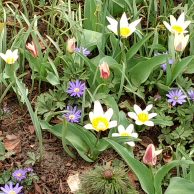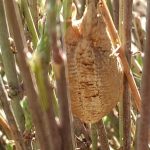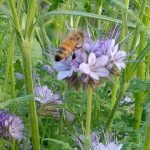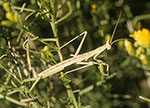 A couple of days ago, I decided to trim back the clumps of Narbonne Flax in my garden, which had been bent over by the heavy snow in March. I grabbed my hedge clippers and cut the first clump down to about 8”. Then I took a closer look at it. Something was in there, and it wasn’t a wad of dry redbud leaves. I had just missed cutting through a Praying Mantis egg case by about a quarter of an inch! A little shaken and much relieved, I inspected all the other clumps carefully before trimming the rest.
A couple of days ago, I decided to trim back the clumps of Narbonne Flax in my garden, which had been bent over by the heavy snow in March. I grabbed my hedge clippers and cut the first clump down to about 8”. Then I took a closer look at it. Something was in there, and it wasn’t a wad of dry redbud leaves. I had just missed cutting through a Praying Mantis egg case by about a quarter of an inch! A little shaken and much relieved, I inspected all the other clumps carefully before trimming the rest.
This was a vivid reminder that our garden allies need safe habitat during their dormant and larval stages, and undisturbed places to hide their eggs.

Praying Mantis egg case
Many a hollow stem becomes a home for beneficials or their eggs. And leaf litter, the stuff so many of us carefully rake off and send to the landfill or compost pile in autumn, feeds the soil by feeding all those below-ground beneficial beings. The leaves also provide winter habitat for beneficial insects in various life stages. Some of our garden protectors are clearly visible, like Ladybird Beetles (ladybugs) in their adult forms, but not so easily seen or recognized in their egg or larval forms. Many of them are tiny, many are well camouflaged, and as a group, they are invisible to us. But the effect of their actions is not invisible.
 Using organic, non-toxic pest controls is good. Preventing harmful insect infestations by providing habitat for beneficial insects is better. I have a small property, 42’ by 90’, including the 980 sq. ft. footprint of the house. Almost all the rest of the yard is intensely planted, with tremendous diversity and as long a bloom season as is possible here in the Boulder Valley. My vegetable garden beds are surrounded by flowering plants that support beneficials and pollinators: lemon balm, Phacelia tanacetifolia (pictured left), Cleome, fennel, parsley, catnip, sweet alyssum, chives, honeysuckle, Salvia, Penstemon, marigolds, snow daisy, larkspur, poppies, gentians, early spring-blooming and late fall-blooming bulbs, pasque flowers, and many more. My bird feeders hang next to the veggie garden. When other gardeners in the neighborhood are alarmed by attacks of flea beetles, the ravages of cabbage worms, or encrustations of aphids, I have little or no insect damage in my garden. (Squirrels are different matter!)
Using organic, non-toxic pest controls is good. Preventing harmful insect infestations by providing habitat for beneficial insects is better. I have a small property, 42’ by 90’, including the 980 sq. ft. footprint of the house. Almost all the rest of the yard is intensely planted, with tremendous diversity and as long a bloom season as is possible here in the Boulder Valley. My vegetable garden beds are surrounded by flowering plants that support beneficials and pollinators: lemon balm, Phacelia tanacetifolia (pictured left), Cleome, fennel, parsley, catnip, sweet alyssum, chives, honeysuckle, Salvia, Penstemon, marigolds, snow daisy, larkspur, poppies, gentians, early spring-blooming and late fall-blooming bulbs, pasque flowers, and many more. My bird feeders hang next to the veggie garden. When other gardeners in the neighborhood are alarmed by attacks of flea beetles, the ravages of cabbage worms, or encrustations of aphids, I have little or no insect damage in my garden. (Squirrels are different matter!)

Grasshopper mantid. Photo Credit: CSU Extension
I once watched a parade of tiny Praying Mantis emerge from their egg case in my garden. There were dozens and dozens of them! Some of them probably didn’t make it to adulthood, but there were so many that I’m sure the survivors provided invaluable protection service that kept my garden thriving, with no sprays, no dusting, no special effort on my part.
Happy gardening!
– Eve
